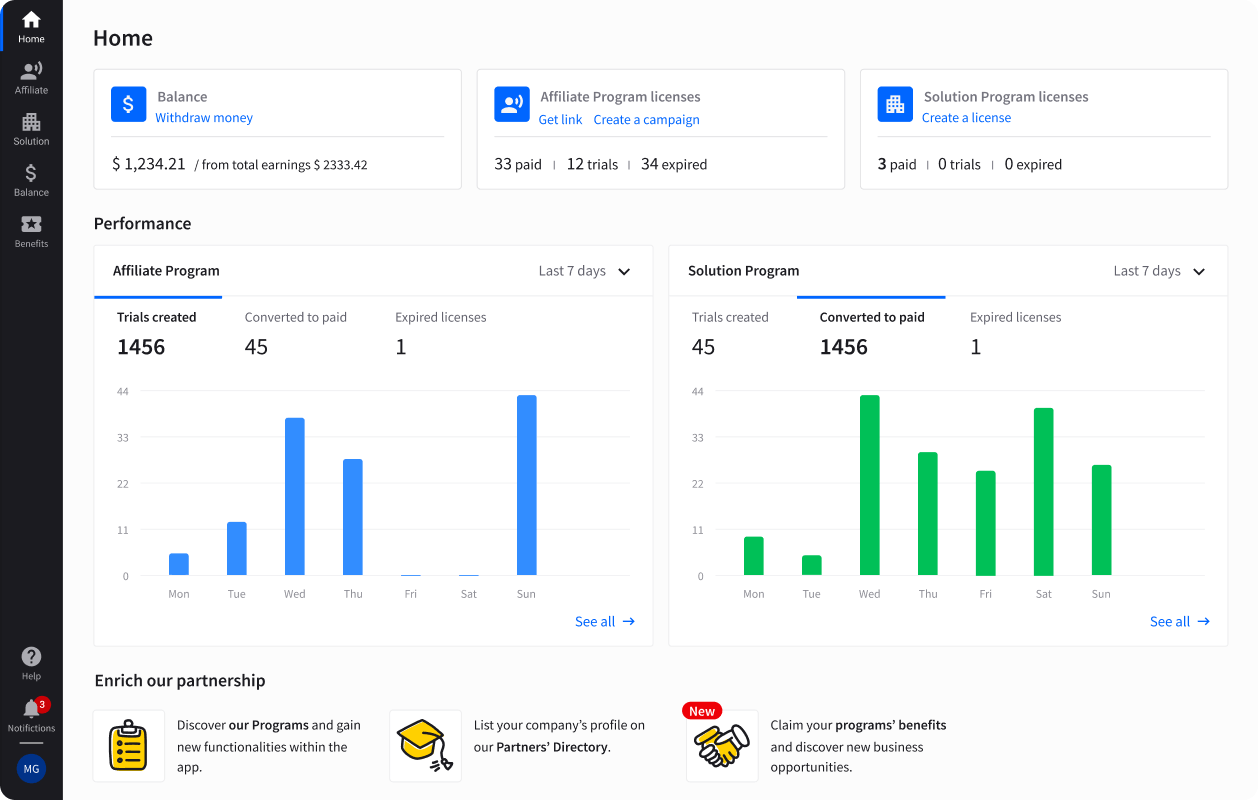Showing top 0 results 0 results found
Showing top 0 results 0 results found

Ever feel like you're shouting into a void, pouring time and money into digital marketing strategies that don't deliver because the market's oversaturated? Or you may be frustrated by high competition, low conversion rates, and a constant struggle to stand out.
So, how do you break through the noise? One solution is to focus on a specific, underserved niche. Doing so lets you carve out a unique space, connect deeply with your audience, and even face less competition.
Let's explore areas that are brimming with potential and ripe for innovation. The fresh, untapped niches that can help you capture the attention of a targeted audience and drive real results!
Understanding niche profitability and competition
Niching down doesn’t mean you’re stepping into some magical land where there’s zero competition. What it actually means is that you’re entering a smaller, more focused space where the competition is much more manageable. It’s about finding your own little corner of the market and standing out.
Instead of competing with huge, established brands in a broad niche like “digital marketing,” you zoom into something more specific like “email marketing automation for eCommerce” and focus all your efforts there. You're not eliminating competition completely. You’re just making it easier to compete and win.
Do competitor analysis
Competitor analysis and market research become your secret weapon once you’ve picked a niche idea. This isn’t about casually stalking their social media. It’s about getting strategic and digging deep to uncover:
- What they’re doing well
- Where they’re falling short (Hint: This is your opportunity!)
Here’s what to focus on:
- Website analysis: Review competitors’ websites to understand how they position their offerings. Look at their content topics, tone, and engagement levels.
- Content gap analysis: Identify topics they cover well and areas they overlook. This can reveal opportunities to provide better or additional content.
- Backlink and SEO metrics: Use SEO tools to examine competitors’ keyword rankings and backlink profiles. This information helps determine the difficulty of ranking for specific terms and highlights areas where you might gain a competitive advantage.
If you find any gaps, you step in, providing what they’re missing and positioning yourself as the go-to expert in that space.

Profitability + competition = The sweet spot
A profitable niche isn’t just about finding something people want. It’s about making sure there’s room for YOU to thrive. Here’s how to assess both profitability and competition:
- Search volume and trends: Ensure that there is a steady or growing level of interest.
- Cost‑per‑click (CPC) and conversion potential: High CPC values or proven conversion rates indicate a commercially attractive niche.
- Engagement metrics: Predict future demand by looking at website traffic, social media engagement, and content performance.
Data‑driven decision-making means using these numbers to validate your assumptions. For example, if the data shows that interest in “local SEO for small businesses” is growing steadily and competitors are not deeply addressing subtopics (such as “SEO for real-estate businesses in Florida”), this niche might be ripe for entry. Finding a growing niche with some competition (but not too much) is a strong sign you’re on the right track.
Why being in a specific niche makes everything easier
Here’s the beauty of niching down: it simplifies everything. You’re no longer trying to appeal to everyone. Instead, you’re speaking directly to a well-defined audience.
- Targeted content becomes easier to create and more impactful.
- Ad campaigns cost less because you’re not competing in crowded spaces.
- Building authority happens faster when you specialize.
Once your foundation is solid, all kinds of opportunities start opening up. And that’s when the real fun begins: brainstorming niche ideas that you can dominate!

Top digital marketing niches for today and tomorrow
As you already know, there are many popular niches in the digital marketing industry, such as SEO, PPC, email marketing, content marketing, social media marketing, and affiliate marketing. Search engine optimization helps businesses rank higher on search engines and drive organic traffic, while PPC is all about running paid ads to get immediate visibility.
Then there’s email marketing, which focuses on building relationships and boosting conversions through targeted email campaigns. And, of course, content marketing is about creating valuable content to attract and engage an audience.
You probably already know these niches because they’re everywhere. But they’re super competitive. So you can narrow them down even further. Instead of general SEO, think local SEO for plumbers or real estate businesses in New York. It’s all about finding a point where demand is high but competition is manageable. Let’s break down some of those specific, less-saturated, lucrative digital marketing niches.
1. Local SEO for niche businesses
Imagine being the go-to person who helps local businesses like dentists, hair salons, or cozy little restaurants appear when someone searches for them online. That’s what local SEO is all about. These businesses rely on local customers.
As a service provider, you’ll optimize their Google Business Profile, build local citations, and fine-tune their website with local keywords. Whether it’s a dentist who wants to rank for “emergency dentist in Brooklyn” or a family-owned restaurant targeting “best vegan pizza in Portland,” your job is to help them stand out in a competitive local market.
Businesses love this because it translates directly into more customers walking through their doors. And trust me, the demand is growing fast!
2. Voice search optimization
“Hey Siri, find me a nearby bakery.” Sound familiar? Voice search is booming, thanks to virtual assistants becoming part of our daily lives. As a voice search optimization specialist, your job is to help businesses tailor their content so it’s voice-friendly and easily picked up by these devices.
It’s a whole new game. You’ll focus on long-tail conversational keywords, ensuring content answers specific, spoken questions. You’ll also help businesses improve site speed and mobile usability since these factors greatly influence voice search rankings.
Also, voice search is still relatively new, so businesses that get on board early have a huge advantage, and you’ll guide them there!
3. Chatbot and conversational marketing solutions

-> Read about how Wembley Stadium earned over $1.5M with ChatBot
Ever interacted with a website chatbot that answered your questions in seconds? That’s conversational marketing at work, changing how businesses engage with customers. As a chatbot marketing expert, you’ll help businesses create intelligent, friendly bots that offer 24/7 customer service without missing a beat.
This service is perfect for eCommerce stores, online coaches, and service-based businesses that can’t always respond instantly. You’ll design bots that can answer FAQs, take bookings, recommend products, and collect leads while improving user experience.
Your goal? Help businesses turn casual visitors into loyal customers by offering instant, personalized support. Companies love chatbots because they save time, boost engagement, and reduce the workload on their customer service teams.
Let me pause for a moment to say that if you’re considering this niche, you can try our ChatBot for free. Explore its features, see the results firsthand, and if you find it valuable, you might even want to become our Partner and share it with your audience.
Want to learn more about our Partner Program? Visit our main website and decide which program will fit you best!
Let's become Partners!
Join our program, test our products for free and gain a new stream of steady income.

4. Micro-influencer marketing
Forget celebrity influencers with millions of followers. Micro-influencers, those with smaller but highly engaged audiences, are where the real magic happens. These influencers often have a loyal community that trusts their opinions, making them perfect for niche brands.
As a micro-influencer marketing strategist, you’ll connect businesses with influencers who align with their brand and audience. You’ll manage partnerships, plan marketing campaigns, and track performance to ensure they get the most bang for their buck.
For example, a vegan skincare brand might collaborate with a beauty influencer with 15,000 followers but consistently get high engagement. That kind of targeted promotion can drive serious results. Also, micro-influencer campaigns are more affordable and often feel more authentic than those big-name sponsorships.
5. Podcast marketing
Podcasts are exploding in popularity, and it’s not just big networks cashing in. Small, niche podcasters are thriving, too. But growing and monetizing a podcast isn’t easy.
That’s where you’ll help podcasters build their audience, increase downloads, and monetize through sponsorships and affiliate marketing. This could involve creating content strategies, optimizing podcast SEO (yes, that’s a thing!), and running social media campaigns to promote new episodes.
Want to take it a step further? Help them repurpose podcast content into blog posts, YouTube videos, or social media snippets. Podcasters are busy creating great content. They need someone like you to handle the growth side. And with more people jumping on the podcasting train, the market demand for these services only increases!
6. Online communication

These days, real-time communication is everything. Customers don’t want to wait hours (or even minutes) for a response. They expect instant answers. In the online communication niche, you can help businesses improve how they communicate with their customers using tools like live chat.
And let me stop here again to say that we find our LiveChat to be a game-changer for businesses.
If a visitor lands on a website, ask questions about a product, and boom! A friendly chat window pops up, offering instant support. No delays, no frustration. This tool isn’t just about answering questions. It’s about creating meaningful conversations that build trust and boost sales.
And here’s the exciting part: as our Partner, you can offer LiveChat and gain up to 22% commission (if you decide to become our Affiliate Partner). You’ll help businesses set it up, integrate it into their websites, and train their teams to use it effectively.
Whether it’s small eCommerce stores, SaaS companies, or service-based businesses, they’ll love the seamless experience LiveChat provides.
Join the online communication niche!
Join our Partner Program and offer LiveChat to your audience.

7. Video Marketing for short-form content
Short-form content is ruling the internet right now. TikTok, Instagram Reels, and YouTube Shorts are where brands are grabbing attention and going viral. As a short-form video marketing specialist, you can help businesses create engaging, bite-sized videos that pack a punch.
It’s not just about dancing trends (although those can work, too!). The key is storytelling, whether it’s showcasing a product, sharing a customer testimonial, or offering quick tips. You can help brands plan and create content that’s fun, authentic, and optimized for each platform’s algorithm.
Plus, short-form videos get massive organic reach. So, whether it’s a small local boutique or a growing online brand, short-form content is the fastest way to build awareness. Trust me, with the right strategy, even a 15-second video can do wonders!
8. Affiliate marketing for niche products
Affiliate marketing is everywhere, but it’s all about finding the right niche. Instead of joining overcrowded markets like beauty or fitness supplements, you can help businesses target specific product categories that aren’t already flooded with affiliates. Think eco-friendly home gadgets, pet accessories, or unique health products.
Also, you can guide brands on how to attract the right affiliates and those who genuinely believe in their product and create campaigns that convert. The focus is on building partnerships with content creators, niche bloggers, and influencers who speak directly to the brand’s target audience.
Done right, the affiliate marketing niche can be a goldmine. It’s a win-win: businesses expand their reach, and affiliates get rewarded for their efforts. The trick is being strategic and thinking beyond the obvious product categories!
9. Content personalization strategies
Gone are the days when generic content worked. Today, it’s all about personalization and expertise, delivering content that feels like it was made just for your audience. You can help brands create dynamic, highly targeted content that speaks to different customer segments.
Using data, you can help businesses understand their audience better. From personalized product recommendations on eCommerce sites to custom email campaigns that hit the right note, the goal is to make every interaction feel personal.
For example, instead of sending a single email blast, you can segment the audience by interest or purchase history. Someone who recently bought running shoes? Let’s send them a curated list of fitness gear! Personalization not only boosts engagement. It makes customers feel seen.
10. Email marketing automation for eCommerce
Email is far from dead. It's one of the most powerful tools for eCommerce brands. But it’s not just about sending newsletters anymore. It’s about automated, segmented campaigns that turn browsers into buyers and keep customers coming back.
You can help businesses build smart email sequences that nurture leads, recover abandoned carts, and reward loyal customers. From welcome series and post-purchase emails to targeted product recommendations, automation makes it all happen seamlessly.
You can also set up a system that runs in the background while you sleep, sending the right message at just the right time. And it’s not just about sales: it’s about creating a relationship with customers. When done right, email automation can deliver crazy-high ROI, and you can help brands unlock that potential.
11. Mobile-first marketing for hyperlocal businesses
These days, everyone’s on their phone. Especially for local and hyperlocal businesses, mobile is everything. That’s where you can help businesses create mobile-first marketing strategies that target customers in their specific area.
From mobile-friendly websites and location-based ads to optimizing Google Business Profiles, the goal is to make it ridiculously easy for mobile users to find and engage with a business. Hyperlocal strategies are all about reaching people who are literally around the corner.
Whether it’s a coffee shop running mobile-only promotions or a local gym targeting nearby residents, mobile-first marketing gets results. Also, it’s measurable and cost-effective. You can make sure businesses are right where their customers are: on their phones!
12. Social media management for specific markets
Social media platforms are powerful tools, but managing them without a strategy is difficult. That’s a fast track to getting lost in the noise. As a social media manager, you could help businesses stand out by crafting targeted content that speaks directly to their audience.
For example, what works for a fashion brand won’t necessarily work for a local dental practice. You’d customize strategies based on the market’s unique needs. For instance, a fitness studio might thrive with workout tips and Instagram Reels, while a B2B company might focus on LinkedIn thought leadership.
From creating content calendars to managing ads and analyzing results, you’d be the go-to expert for brands looking to grow their social presence. Businesses get strategies, higher engagement, and actual results, not generic social media advice.
13. Digital advertising for boutique real estate firms
Boutique real estate firms face different challenges than big players. They need targeted, hyper-local ad campaigns that focus on quality leads, not mass audiences. And you can offer digital marketing services for realtors and property managers in niche markets.
You’d craft personalized ad strategies that showcase properties to the right people. Whether it’s luxury homes, vacation rentals, or commercial spaces. Using platforms like Facebook Ads and Google Ads, you’d help real estate businesses build their online presence, generate leads, and close deals faster.
What sets you apart? It’s your ability to refine targeting, write compelling copy, and optimize campaigns to stretch every marketing dollar. For boutique firms, that’s the kind of expertise that makes all the difference.
14. PPC campaigns for niche eCommerce Stores
Running a niche eCommerce store is tough. Competing with giants like Amazon on PPC ads? Even tougher. However, a specialized PPC strategist could help niche stores run cost-effective, highly targeted pay-per-click campaigns that get real results.
It’s all about laser-focused targeting. Instead of wasting money on broad keywords, you’d focus on long-tail search terms that attract buyers looking for exactly what the store sells. Selling handmade vegan candles? Target “eco-friendly soy candles” instead of just “candles.”
By optimizing bids, refining keywords, and continuously tweaking ads, you’d help niche stores boost traffic and conversions without blowing their budget. Every click counts, and you’d make sure those clicks turn into sales.
15. SEO for niche online marketplaces
Niche online marketplaces are growing, but many struggle with visibility. As an SEO specialist, you’d help them climb search rankings and attract the right audience.
You'll create a comprehensive SEO strategy, work on technical SEO, and optimize site speed and mobile-friendliness. Then, focus on content marketing and building backlinks from relevant sources.
For example, a marketplace for vintage home decor needs different SEO tactics than one for specialty pet products. You’d dig into keyword research, find long-tail opportunities, and ensure every page is optimized to capture organic traffic. Over time, that traffic turns into steady sales and loyal customers.
16. Conversion rate optimization for landing pages
Driving traffic is great, but what really matters? Conversions. Conversion rate optimization (CRO) focuses on turning visitors into customers. As a CRO expert for landing pages, you’d help businesses boost their results without needing more traffic.
You’d analyze existing landing pages and identify where visitors drop off. Maybe it’s slow load times, unclear calls to action, or too much text. Simple tweaks like optimizing headlines, simplifying forms, or adding trust badges can make a huge difference.
For high-ticket services or niche-specific products, every extra conversion is worth serious money. You’d constantly test and improve elements to maximize results. In short, you’d help businesses stop leaving money on the table and start converting more of their hard-earned traffic.
17. LinkedIn marketing for B2B services
LinkedIn is the go-to platform for B2B businesses, but many professional service firms barely scratch the surface of its potential. As a LinkedIn marketing specialist, you could help these firms build authority and generate leads by creating tailored strategies.
It’s not just about posting updates. You'll be optimizing profiles, sharing thought leadership content, and engaging with the right audience. For example, a legal consultancy could publish case studies, while a financial advisor could share market insights.
You’d also help firms run highly targeted LinkedIn ads to connect with decision-makers. By positioning them as experts in their field, you’d boost visibility and trust, driving more inquiries and clients.
18. App store optimization for mobile apps
Launching a mobile app is only half the battle. The real challenge? Getting people to find it. That’s where App Store Optimization (ASO) comes in. As an ASO specialist, you’d help businesses improve their app’s visibility and rankings in app stores.
It’s more than optimizing the app’s title, description, and keywords while ensuring great visuals like icons and screenshots. You’d track trends, analyze competitors, and run A/B tests to improve download rates. For niche apps like fitness trackers for runners or budgeting tools for freelancers, this kind of optimization can make or break their success.
Your goal? Help niche apps stand out in crowded categories and get discovered by the right users.
19. Content marketing for SaaS companies
SaaS companies live and breathe content marketing. It’s how they build trust, explain complex solutions, and convert leads. A content marketing strategist can help SaaS businesses create valuable, targeted content that resonates with their audience.
It’s not just about blogging. You should focus on case studies, white papers, video tutorials, and email series. You’d create a strategy that aligns content with every stage of the customer journey.
For example, you’d produce SEO-driven articles to attract new leads, then follow up with in-depth guides to nurture them. The right content builds authority and boosts conversions.
20. Niche video advertising
Platforms like YouTube Shorts, Snapchat, and TikTok are goldmines for brands if they know how to use them right. However, the social media marketing niche is saturated. You can try helping niche businesses tap into these platforms to reach new audiences.
This isn’t about generic video ads. You’d create fast, engaging, and platform-specific content that grabs attention within seconds. Whether it’s product demos, how-to videos, or short brand stories, the goal is to drive awareness and conversions.
For niche markets like indie beauty brands or eco-friendly startups, these platforms offer high visibility at a fraction of the cost of traditional ads. You’d craft custom strategies to help brands stay ahead of the curve.
Jump on the AI bandwagon!
Join our Partner Program and offer best communication products fueled with AI!

What industries can you focus on?
When it comes to niching down, the possibilities are endless. You don’t have to target “everyone.” Instead, zoom in on specific industries and help businesses crush their marketing goals. Here are some more digital marketing niche ideas to get you started:
1. Healthcare
Healthcare is booming with niche marketing opportunities. You could:
- Help clinics with patient engagement campaigns to boost appointment rates.
- Promote telemedicine services to reach more patients online.
- Work with wellness brands to create social media content focused on mental health or fitness programs.
2. Finance
Finance can be intimidating to most people, but your marketing skills can simplify it.
- Partner with fintech startups to explain their services to a broader audience.
- Help investment advisors grow through lead-generation campaigns.
- Build educational content for personal finance apps to engage users.
3. Technology
The tech world is always evolving, which means fresh marketing opportunities.
- Create content strategies for SaaS companies to attract and retain users.
- Help cybersecurity firms spread awareness about data protection.
- Collaborate with tech innovators, launching groundbreaking products.
4. Education
The e-learning market is on fire! You could:
- Run paid ads for online courses targeting niche audiences like graphic design or coding.
- Work with educational tool companies to showcase their products through demos and testimonials.
- Develop lead funnels for e-learning platforms to boost enrollments.
5. Travel and hospitality
The travel industry is full of untapped niches.
- Promote eco-tourism destinations to conscious travelers.
- Design campaigns for luxury travel agencies or boutique hotels.
- Build adventure-focused marketing for extreme sports tourism.
6. Food and beverage
Food brands love storytelling, and that’s where you can shine.
- Help organic food brands connect with health-conscious consumers.
- Launch social media campaigns for local farm-to-table restaurants.
- Create influencer partnerships for specialty diets like keto or vegan.
7. Retail and eCommerce
eCommerce is super competitive, but there’s plenty of room for niche targeting.
- Run personalized email campaigns for subscription box companies.
- Focus on sustainable products and build campaigns around eco-friendly values.
- Optimize SEO for boutique retailers selling handmade or custom items.
8. Real estate
Real estate is full of exciting opportunities beyond traditional home buying.
- Craft digital ads for luxury properties targeting high-net-worth individuals.
- Work with smart home companies to highlight cutting-edge tech.
- Promote real estate investment services through educational content.
9. Entertainment and media
Entertainment is constantly growing, and marketers can jump in to help.
- Partner with streaming platforms to run performance-driven ad campaigns.
- Help gaming communities build brand partnerships.
- Build influencer-driven content strategies for media companies.
10. Automotive
The auto industry is changing fast, and niche marketers can make an impact.
- Focus on electric vehicle (EV) brands, helping them expand their reach.
- Build content for niche car accessories or luxury auto parts.
- Promote specialized repair services for vintage or sports cars.
Each of these industries offers tons of potential. The key is finding the right fit, analyzing the competition, and diving in with a focused strategy!

Build a brand and upscale for business success
So, you’ve chosen your niche, but what’s next? Here's how you can turn your niche into a successful business strategy.
a. Strategic Planning
A solid plan is key. You can’t just dive in and hope for the best.
- Define your goals. Are you focused on growing traffic, generating leads, or driving conversions?
- Understand your audience. Who are they? What do they need? What problems can you solve for them?
- Outline your strategy. Decide how you’ll reach your target market: SEO, social media, paid ads, or a mix of everything.
A clear plan keeps you focused and helps avoid distractions.
b. Branding Around a Niche
Your brand is everything, especially in a niche market. Positioning yourself as the go-to expert is what sets you apart.
- Find your unique angle. What makes you different from others in your niche?
- Consistent messaging. Stay true to your niche across all channels like your website, social media, emails, and ads.
- Build authority. Create content that shows off your expertise and helps your audience.
Remember, in a niche, you’re not just a marketer. You’re a specialist.
c. Content Creation
Content is king, but niche-specific content? That’s pure gold. Focus on providing value and solving real problems.
- Answer common questions. Write blog posts, make videos, or create guides that help your audience.
- Use case studies and success stories. Show how your services have helped others.
- Repurpose content. Turn one blog post into social media snippets, infographics, and email content.
The more helpful your content, the more trust you’ll build.
d. Utilizing Multiple Channels
Don’t just stick to one platform. Spread your message far and wide.
- Social media: Share tips, behind-the-scenes content, and success stories. Focus on where your audience hangs out most.
- Email marketing: Stay connected with your audience through valuable updates, exclusive offers, and personalized content.
- Content platforms: Think blogs, podcasts, or YouTube, wherever your audience consumes information.
An integrated approach increases your reach and keeps your brand at the forefront of your mind.
e. Measuring Success
Tracking your progress is crucial. Otherwise, how will you know what’s working?
- Website Traffic: Keep an eye on visits, bounce rates, and time spent on pages.
- Engagement Metrics: Track social shares, comments, and email open rates.
- Conversion Rates: How many people take the action you want—whether it’s signing up, purchasing, or booking a call?
Many digital marketing agencies use tools like Google Analytics, SEMrush, or even social platform insights to measure results and adjust your strategy.
f. Upscaling
Once you’ve nailed your niche, it’s time to grow!
- Automate processes. Use tools for social media scheduling, email campaigns, and CRM.
- Expand services. Offer complementary services or products that fit your niche.
- Build partnerships. Collaborate with other businesses to reach new audiences.
Upscaling doesn’t mean losing your niche focus. It just means doing more of what’s already working!
The key to success in any niche is strategy, consistency, and measuring progress. Keep refining, stay focused, and watch your niche-based business grow!

Summing Up
There you have it. 20+ profitable digital marketing niches that are waiting for someone like you to dominate! The truth is, niching down isn’t limiting. It’s empowering. It helps you cut through the noise, stand out from the competition, and focus on serving a specific audience.
Here’s a quick recap before you dive in:
- Don’t fear competition: Find a manageable niche and make it yours.
- Do your research: Competitor analysis, keyword research, and understanding trends are your best friends.
- Focus on value: Always aim to solve real problems for your niche audience.
- Stay consistent: Build your brand around your niche and stick to it.
Remember, the magic happens when you pair strategy with passion and persistence. Pick a niche, start small, and grow from there. You’ve got this! Now, claim your corner of the digital marketing world.


